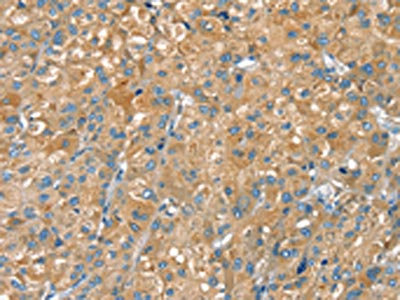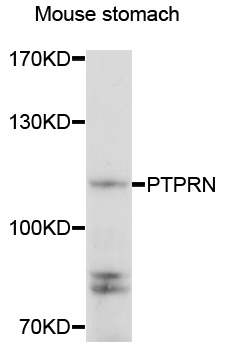
WB analysis of NIH-3T3 lysate using GTX88611 PTPRN antibody, Internal. Dilution : 0.5μg/ml Loading : 35μg protein in RIPA buffer
PTPRN antibody, Internal
GTX88611
ApplicationsWestern Blot
Product group Antibodies
ReactivityHuman, Mouse
TargetPTPRN
Overview
- SupplierGeneTex
- Product NamePTPRN antibody, Internal
- Delivery Days Customer9
- Application Supplier NoteWB: 0.5-1.5microg/ml. *Optimal dilutions/concentrations should be determined by the researcher.Not tested in other applications.
- ApplicationsWestern Blot
- CertificationResearch Use Only
- ClonalityPolyclonal
- Concentration0.50 mg/ml
- ConjugateUnconjugated
- Gene ID5798
- Target namePTPRN
- Target descriptionprotein tyrosine phosphatase receptor type N
- Target synonymsIA-2, IA-2/PTP, IA2, ICA512, R-PTP-N, receptor-type tyrosine-protein phosphatase-like N, ICA 512, PTP IA-2, insulinoma-associated tyrosine-phosphatase-like protein, islet cell antigen 2, islet cell antigen 512, islet cell autoantigen 3, protein tyrosine phosphatase-like N
- HostGoat
- IsotypeIgG
- Protein IDQ16849
- Protein NameReceptor-type tyrosine-protein phosphatase-like N
- Scientific DescriptionThe protein encoded by this gene is a member of the protein tyrosine phosphatase (PTP) family. PTPs are known to be signaling molecules that regulate a variety of cellular processes including cell growth, differentiation, mitotic cycle, and oncogenic transformation. This PTP possesses an extracellular region, a single transmembrane region, and a single catalytic domain, and thus represents a receptor-type PTP. This PTP was found to be an autoantigen that is reactive with insulin-dependent diabetes mellitus (IDDM) patient sera, and thus may be a potential target of autoimmunity in diabetes mellitus. Alternate splicing results in multiple transcript variants.[provided by RefSeq, Dec 2010]
- ReactivityHuman, Mouse
- Storage Instruction-20°C or -80°C,2°C to 8°C
- UNSPSC41116161





